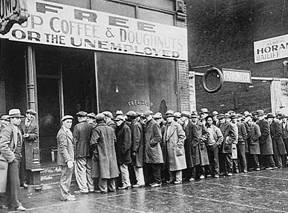Decline of U.S. Economy is the Logical Outcome of Keynesian Economics
Politics / Economic Theory Feb 01, 2012 - 06:29 AM GMTBy: Ron_Hera
 The Unholy Alliance of John Maynard Keyne
The Unholy Alliance of John Maynard Keyne
Perhaps the greatest modern champion of central economic planning was the 20th century English economist John Maynard Keynes. Keynes, who was a political socialist and for a time a central banker, advocated the idea that the government should play a large, active role in the economy. Among the consequences of Keynes’ economic theories, whether intended or unintended, is the fact that Western economies today are characterized by large, central governments, central banks and massive debts.
|
Leviathan the sea-monster, with Behemoth the land-monster and Ziz the air-monster |
According to Dr. Andrew Gelman, Professor of Statistics and Political Science at Columbia University, “the law of unintended consequences is what happens when a simple system tries to regulate a complex system. The political system is simple. It operates with limited information (rational ignorance), short time horizons, low feedback, and poor and misaligned incentives. Society, in contrast, is a complex, evolving, high-feedback, incentive-driven system. When a simple system tries to regulate a complex system you often get unintended consequences.” Professor Gelman’s statement seems equally apropos to central banking.
Government policies based on Keynesian theories and the institution of central banking form a nexus of central economic planning. Control of the central planning process is a winner-take-all proposition for businesses. In the U.S., the result is an unholy alliance of the U.S. federal government, the Federal Reserve (along with the largest U.S. banks) and the largest U.S. corporations. The logical chain beginning with Keynes’ fundamental idea that government, supported by a central bank, should play a large and active role in the economy sets the stage for a centrally planned economy and ultimately produces a corporate state.
The U.S. economy is locked in a downward spiral of economic decline. By growing in size, and by engaging in ever larger economic interventions, the U.S. federal government became itself a material cause of the recession that began in 2007. By attempting to grow the economy through monetary expansion, i.e., consumer spending fueled by debt, the Federal Reserve destroyed savings and fueled a series of disastrous economic bubbles, culminating in the housing bubble. At the same time, the largest U.S. banks engaged in reckless lending and high-stakes gambling on hundreds of trillions in over the counter (OTC) derivatives. OTC derivatives, which amount to risky, largely un-backed wagers, were the root cause of the “too big to fail” doctrine that has virtually bankrupted Western governments since 2008. By seeking ever greater influence over Washington D.C. and by seeking to generate higher profits by cutting production in the U.S., the largest U.S. corporations undermined the U.S. market and economy. The U.S. federal government did virtually nothing to prevent the destructive developments because of the influence of the largest U.S. corporations.
Following Keynesian economic theories, the policy response of the U.S. federal government to the recession that began in 2007 and of the financial crisis that began in 2008 was to expand the government further and at a more rapid pace. In other words, some of the root causes of the economic imbalances that lead to the recession and financial crisis (the relative size of the government and the resulting economic distortions) were compounded. As a consequence, the so-called “double dip recession” in the U.S. that began in the second half of 2011 will be longer and ultimately more severe than the economic downturn of 2007-2009.
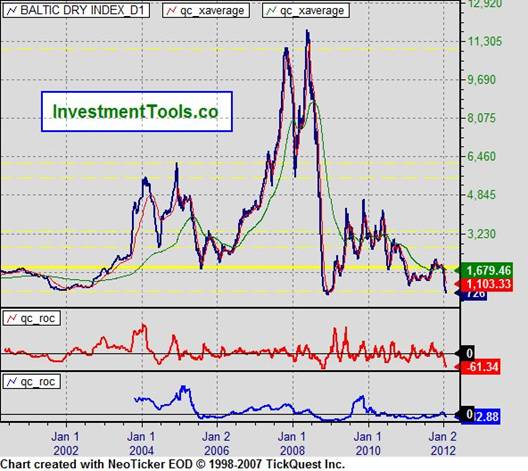
The Baltic Dry Index (BDI) indicates international shipping returning to crisis levels. Since the U.S. is the world’s largest economy and has a large trade deficit, the BDI suggests that the U.S. is in a recession.
Keynes and Leviathan: The Size of the State
Originally a sea monster referred to in the Bible and, in demonology, one of the seven princes of Hell, as well as its gatekeeper, the name Leviathan was adopted by the English philosopher Thomas Hobbes to refer to an artificial political order, i.e., to the institution of the state. Hobbes was concerned with the distinction between individual rights and the powers of sovereign governments and he elaborated the idea of the social contract. When a government taxes its citizens, it implicitly asserts the right of the government over the property rights of individuals and presupposes that the government can make better use of economic resources than households, individual entrepreneurs, businesses and private investors.
In theory, the government’s use of economic resources accomplishes goals that privately owned businesses cannot, such as national defense or emergency response services, i.e., things that, by their nature, are not economically productive or profitable but still necessary for society. In contrast, embarking upon idealistic projects such as “creating jobs” or “expanding home ownership” encroaches on the productive elements of the economy. However, governments are inefficient compared to privately owned businesses due to the absence of competition. Further, the record of history suggests an inability on the part of central planners to make superior economic decisions.
|
Leviathan or The Matter, Forme and Power of a Common Wealth Ecclesiasticall and Civil by Thomas Hobbes (1588–1679) |
Government encroachment on the private sector, like a self fulfilling prophecy, often magnifies the reasons why government intervention was originally believed to be necessary. For example, when the U.S. federal government became involved in education through federally guaranteed student loans, the result was that the cost of a college education rose towards the limit of what students could borrow and repay during their careers simply because the loans were guaranteed by the government. The guarantees produced more and riskier loans, larger loans and higher education costs.
When the U.S. federal government promoted home ownership for minorities and the poor, mortgage loan guarantees resulted in higher home prices and contributed to the sub-prime lending debacle where banks originated loans to unqualified borrowers in order to sell them to government sponsored entities (GSEs), i.e., to Fannie Mae and Freddie Mac, and to investors as collateralized debt obligations (CDOs) and other mortgage backed securities (MBS).
Banks were certainly to blame for knowingly making bad loans, which is fraud, but the conditions that made the problem possible existed substantially because of government intervention in the housing market, i.e., opening the door to fraud was an unintended consequence of policies intended to increase lending to unqualified, low income borrowers. Of course, the U.S. federal government did not compel lenders to commit fraud, thus accountability for the U.S. mortgage disaster is shared by the federal government, which interfered with the free market, pursued misguided policies and failed in terms of regulatory oversight and law enforcement, and by banks, which engaged in widespread mortgage related fraud.
Governments redistribute wealth and manipulate economic activity through taxes, subsidies, guarantees, regulations and so forth, but they do not produce new wealth. Government spending may be for good purposes, or at least stem from good intentions, but it unavoidably favors businesses with close ties to the government over those that are taxed but that do not benefit. Despite the theoretically higher moral purposes of lofty government undertakings, government programs that overlap the private sector divert economic resources to businesses that have the favor of politicians minus the cost of government, thus producing economic distortions and a net loss of wealth for society.
The Rahn curve is an economic theory proposing that there is an optimal level of government spending, 15% to 25% of gross domestic product (GDP), to maximize economic growth.
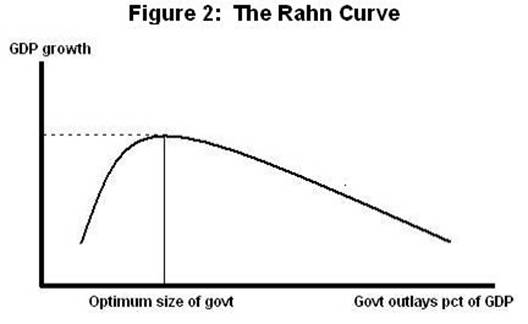
As the government grows larger, economic growth is curtailed and, eventually, the economy contracts, crushed under the burden of government.
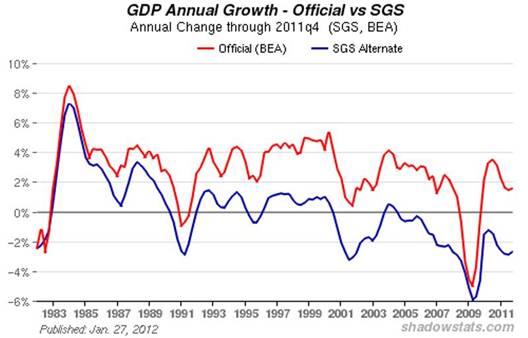
As the government grows in size relative to the economy, not only is economic growth compromised, but the potential for, and the cost of, government waste, fraud and abuse increases.
How the Government Destroys Jobs
While politicians extol the theoretical benefits of ever more government control of the economy, e.g., through increased regulation, from the standpoint of individual entrepreneurs, businesses and private investors, the government is a nuisance, an impediment to wealth creation, and the source of countless costs and risks. The larger the government becomes relative to the size of the economy, the more it tends to discourage economic activity. Although roughly 70% of U.S. jobs are created by small businesses, ranging from family owned businesses to high technology startups, the burden of government falls disproportionately on them because they have fewer resources with which to administer and to demonstrate compliance with government regulations.
|
Picture from the Franklin D. Roosevelt Library, courtesy of the National Archives and Records Administration. |
When large companies are audited or investigated by any of several government agencies, their accounting, legal and compliance departments are well equipped to deal with such matters. However, when a small company faces the same hurdles or seeks government permits, licenses or certifications, its operations are directly impacted and the associated accounting, legal and regulatory compliance costs can cause the business to lose money or to fail. In the event of an audit or investigation, small business owners in the U.S. generally seek to comply immediately and often pay fines or penalties without contest in order to end the government’s interference. While large companies can afford to dispute the government, small businesses face the equivalent of extortion.
As a practical matter, small businesses in the U.S. are permitted to operate at the sole discretion of government bureaucrats that can effectively shut down small businesses without any evidence of wrongdoing. Setting aside the fact that small business owners live in constant and well justified fear of their own government, the result is a stifling of economic activity and a net loss of jobs. For example, traditional small businesses in the U.S., i.e., sole proprietorships, increasingly avoid hiring employees.
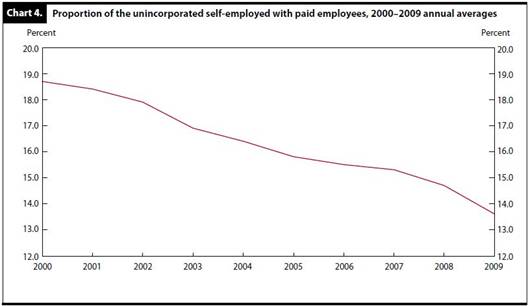
Free market competition and the inherent uncertainty of economic conditions provide ample risk for startup businesses. A disproportionately large government relative to the size of the economy damages economic activity and discourages investment in new businesses. The aggregate overhead of government regulations and regulatory compliance, along with taxes and potential penalties, e.g., the 2010 Patient Protection and Affordable Care Act (“Obamacare”), increases business costs, amplifies business risks and further increases the burden of regulatory compliance. The result of systematically increasing the costs and risks of doing business—in lock step with the size of government—is to reduce the rate of business formation and to encourage investors to look elsewhere to find returns.
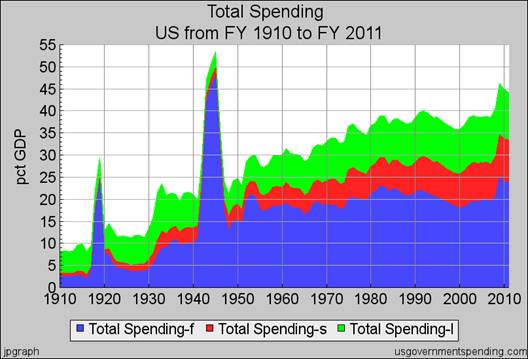
If the U.S. government, currently almost 45% of GDP, desired to create jobs, the correct policy would be to greatly reduce the countless regulations, taxes and fees that encumber small businesses. The path to job creation is for the government to reduce job destruction. Since no political will to reduce the size of the government exists, however, continued shrinking real GDP and permanent workforce reduction can be expected.
Keynes and Ziz: Money Out of Thin Air
Ziz, the beast of the air, is a giant griffin-like bird in Jewish mythology large enough to blot out the sun with its wingspan. Central banks, such as the Federal Reserve, are examples of central economic planning, i.e., they control the money supply and exercise centralized control over the value and cost of money through interest rates, bank reserve ratios, monetary inflation and by other means. In contrast to the government’s central planning for the putative public good, the Federal Reserve engages in central planning for the benefit of banks. Like the U.S. federal government, the Federal Reserve, through monetary mechanisms, distorts spending and investment patterns, redistributes wealth and preempts the financial and economic decisions of households, individual entrepreneurs, businesses and private investors.
|
The Bank of England, established 1694 (also known as The Old Lady of Threadneedle Street) |
When a central bank increases the money supply beyond the level necessary to support a sustainable economy or population growth, it destroys the value of savings and wages by diluting the value of money and causing prices to rise. Wall Street embraces the Federal Reserve because easy monetary policies provide an inexpensive way to finance operations and to expand, but there is a cost. Inflationary monetary policies favor speculators over savers and debt over genuine capital formation.
Banks do not create wealth. The structure of the financial system, where debt-based money is created ex nihilo, virtually guarantees banks a piece of the action whenever wealth is created. When debt service (principal and interest payments) is attached to the income streams of consumers and businesses, excess production is diverted from capital formation into the coffers of banks. The Federal Reserve, therefore, is at the core of a system where, over time, wealth accrues to banks while capital formation is reduced, ironically increasing the need to borrow. The majority of entrepreneurs and businesses have little choice but to borrow and, even if they are successful, the economy as a whole may still suffer due to increased debt levels relative to GDP.
Keynesians embrace the Federal Reserve’s un-backed, fiat money because it permits the government to borrow and spend freely based on the theory that stimulating the economy through deficit spending produces economic growth at a faster pace than debt accumulates. However, as a function of debt service, the number of dollars that must be borrowed and spent to generate each new dollar of GDP becomes larger as the total amount of debt grows.
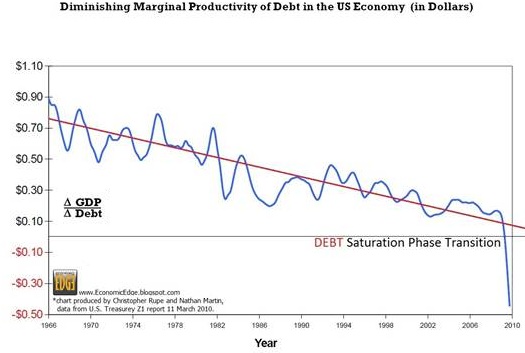
The result is debt saturation where further debt funded increases in GDP are impossible and where, therefore, existing government debt cannot be retired, i.e., the result of Keynes’ theory, taken to an extreme, is government insolvency and sovereign default. Default, of course, can take the form of monetary inflation in order to debase the currency and reduce the real value of debt, e.g., the Federal Reserve’s monetary easing and continued accommodative monetary policy.
Keynes and Behemoth: The Corporatocracy
Behemoth is a mythological beast of the land mentioned in the Book of Job (40:15-24) that has come to describe any extremely large or powerful entity. The U.S. economy is anything but a free market today. In fact, the U.S. government increasingly resembles an oligarchy in which the oligarchs are large corporations, i.e., a “corporatocracy”. Thus, the illegitimate offspring of the grand government envisaged by Keynes and the institution of central banking is a corporate state.
Without a large government, businesses have little incentive to influence it, but with the government (local, state and federal) representing nearly half of the U.S. economy, influencing the government is a mission-critical objective for every company. The size of government implied by Keynesian economics provides motive and opportunity but only the largest corporations have the means to succeed.
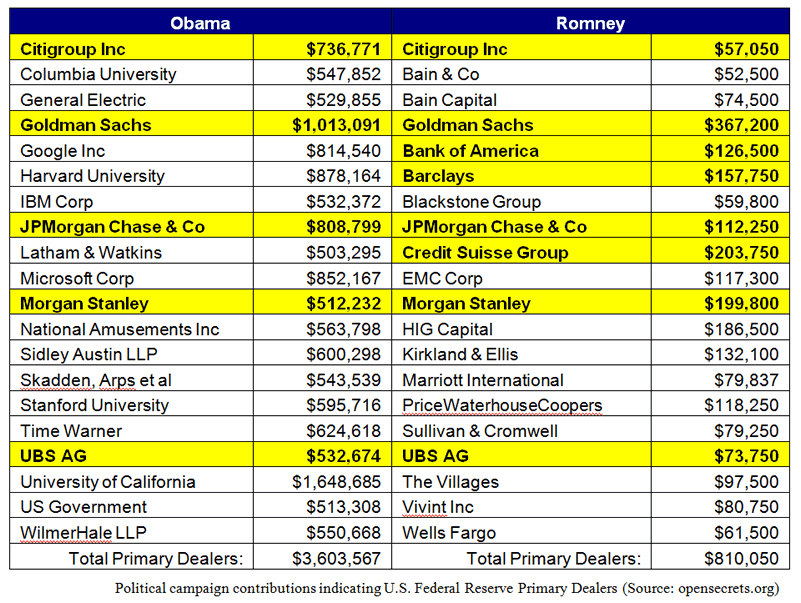
The goals of businesses seeking to influence the government include winning government business, mandating consumption of products and services (from child car seats to health insurance), avoiding taxes, guaranteeing profits, creating regulatory loopholes, protecting markets, eliminating competition, socializing losses and so forth.
The influence of Wall Street over Washington D.C. through political campaign contributions, corporate lobbyists and revolving doors (where the same individuals alternate between closely linked private sector jobs and government posts) is almost absolute. Lobbyists are intimately involved in writing legislation that is often rubberstamped by the U.S. Congress, i.e., passed without reading or meaningful debate. The largest corporations support political candidates through campaign contributions and by funding political action committees that, among other things, use corporate public relations tools for political purposes, i.e., propaganda. Key government posts are consistently held by individuals with clear conflicts of interest and the existence of such conflicts is routinely ignored.
The current reality of the United States is that the largest corporations have hijacked the Keynesian central planning powers of the federal government and have used these powers to encourage ever larger and more direct interventions in the economy for their own benefit, as well as laws and regulations that serve as a barrier to free market competition. U.S. regulators, such as the Securities and Exchange Commission (SEC), Commodities and Futures Trading Commission (CFTC) and the Food and Drug Administration (FDA) appear to have been captured by the industries they are intended to regulate. Government regulators selectively enforce regulations, often against small businesses and growing companies, such as organic dairy farmers, protecting the interests of the largest corporations from small businesses, free market competition and consumer choice.
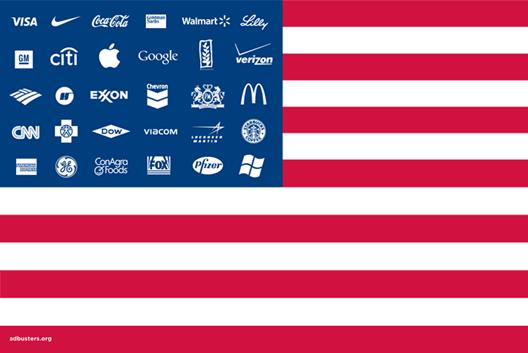
The largest U.S. corporations (including oil companies like ExxonMobil and Chevron; drug companies like Johnson & Johnson, Pfizer and GlaxoSmithKline; agribusiness companies like Archer Daniels Midland, which are heavily subsidized by the U.S. federal government; agricultural biotechnology companies like Monsanto; military contractors like Lockheed Martin, Northrop Grumman, Boeing, Raytheon and General Dynamics; and banks like Bank of America, J. P. Morgan Chase, Citigroup, Wells Fargo, Goldman Sachs and Morgan Stanley) have not only been the beneficiaries of government expansion, deficit spending and central economic planning, but, considering political campaign funding practices, have become the de facto oligarchs of America.
Leviathan, Ziz, Behemoth and Keynes
The decline of the U.S. economy is the logical outcome of Keynesian economics, which enshrines central economic planning and embraces central banking. The unholy alliance of Leviathan, Ziz and Behemoth (the federal government, the Federal Reserve and Wall Street) has all but eliminated capitalism and has transformed the United States from a burgeoning free market economy into a failing corporate state.
The U.S. federal government, the Federal Reserve and Wall Street each played a role in the progression from central economic planning and central banking to a corporate state. Politicians used Keynesian economics to justify big government, a welfare state and budget deficits. The Federal Reserve sought to grow the economy through monetary expansion, focusing on consumption but ignoring debt levels and inadvertently encouraging financial speculation. At the same time, Wall Street sought higher profits both by eliminating production (and jobs) in the U.S. and by sparing no expense to influence the government. The resulting corporate state undermined capitalism and the free market in the United States and produced a downward spiral of economic decline from which there is no escape without fundamental reforms.
About Hera Research
Hera Research, LLC, provides deeply researched analysis to help investors profit from changing economic and market conditions. Hera Research focuses on relationships between macroeconomics, government, banking, and financial markets in order to identify and analyze investment opportunities with extraordinary upside potential. Hera Research is currently researching mining and metals including precious metals, oil and energy including green energy, agriculture, and other natural resources. The Hera Research Newsletter covers key economic data, trends and analysis including reviews of companies with extraordinary value and upside potential.
###
Articles by Ron Hera, the Hera Research web site and the Hera Research Newsletter ("Hera Research publications") are published by Hera Research, LLC. Information contained in Hera Research publications is obtained from sources believed to be reliable, but its accuracy cannot be guaranteed. The information contained in Hera Research publications is not intended to constitute individual investment advice and is not designed to meet individual financial situations. The opinions expressed in Hera Research publications are those of the publisher and are subject to change without notice. The information in such publications may become outdated and Hera Research, LLC has no obligation to update any such information.
Ron Hera, Hera Research, LLC, and other entities in which Ron Hera has an interest, along with employees, officers, family, and associates may from time to time have positions in the securities or commodities covered in these publications or web site. The policies of Hera Research, LLC attempt to avoid potential conflicts of interest and to resolve conflicts of interest should any arise in a timely fashion.
Unless otherwise specified, Hera Research publications including the Hera Research web site and its content and images, as well as all copyright, trademark and other rights therein, are owned by Hera Research, LLC. No portion of Hera Research publications or web site may be extracted or reproduced without permission of Hera Research, LLC. Nothing contained herein shall be construed as conferring any license or right under any copyright, trademark or other right of Hera Research, LLC. Unauthorized use, reproduction or rebroadcast of any content of Hera Research publications or web site, including communicating investment recommendations in such publication or web site to non-subscribers in any manner, is prohibited and shall be considered an infringement and/or misappropriation of the proprietary rights of Hera Research, LLC.
Hera Research, LLC reserves the right to cancel any subscription at any time, and if it does so it will promptly refund to the subscriber the amount of the subscription payment previously received relating to the remaining subscription period. Cancellation of a subscription may result from any unauthorized use or reproduction or rebroadcast of Hera Research publications or website, any infringement or misappropriation of Hera Research, LLC's proprietary rights, or any other reason determined in the sole discretion of Hera Research, LLC. ©2011 Hera Research, LLC.
© 2005-2022 http://www.MarketOracle.co.uk - The Market Oracle is a FREE Daily Financial Markets Analysis & Forecasting online publication.






